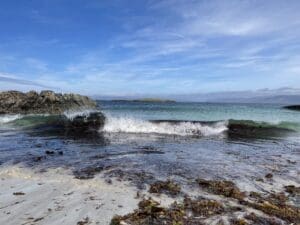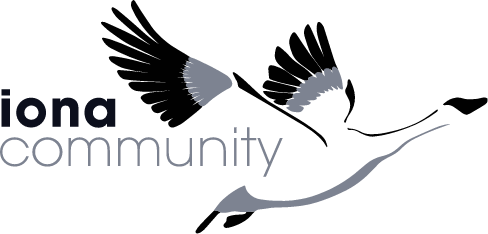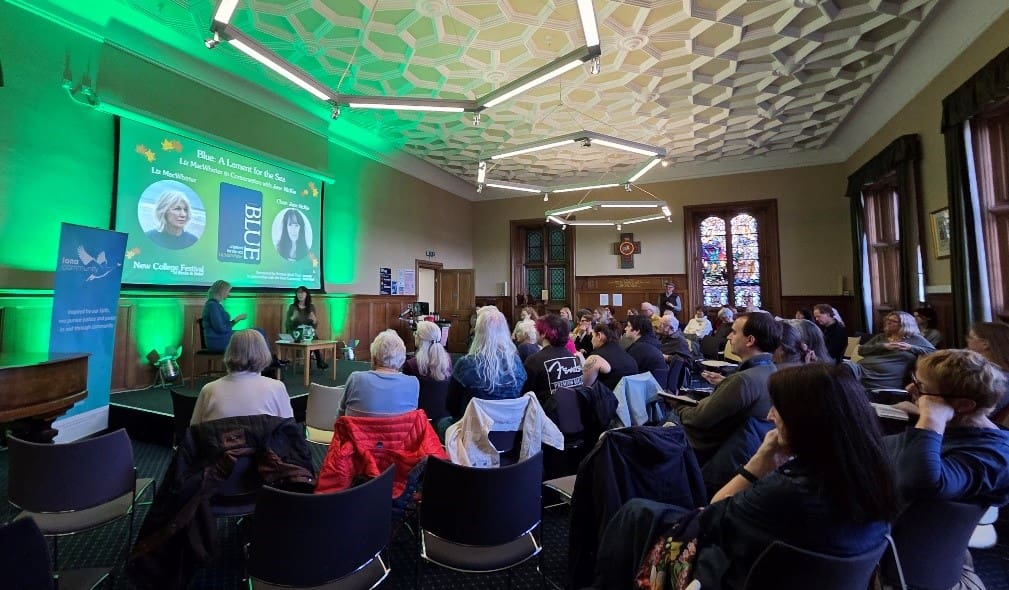“Let mercy flood with all love”, Rolf Billes hears a lament for the sea
This year’s New College Festival of Books and Belief took place on 7-8 November in Edinburgh and the Iona Community was invited, as a learning partner, to participate in the event which included a reading of Liz MacWhirter’s beautiful long prose poem ‘Blue: A Lament for the Sea’.
The inspiration for the poem comes from a medieval prophecy in Scottish Gaelic that foretells an apocalyptic sea flood, above which the sacred Isle of Iona shall arise. Words that have wintered a thousand years unfold in the poem, haunting the Anthropocene Epoch. The 20-minute performance is a poetic vision of a journey through ecological grief, immersing the audience in a surreal, flooding landscape.
After the poem, Liz was joined in conversation by fellow poet Jane McKie, and the two discussed environment and landscape, the impetus for taking renewed responsibility for the planet, and the contemplative theology of historical figures such as Julian of Norwich.
Just three weeks prior to the event at New College, Liz MacWhirter had read ‘Blue’ on Iona at its inaugural Festival of Writing and Storytelling, and so I was pleased to offer a response to the poem on behalf of the Iona Community.
How could we let climate change happen?
We are living on a planet which is fast becoming unliveable for major parts of the world, in no small part due to human activity. We are witnessing aggravated drought, weather instability, flooding, wildfires, biodiversity loss, imperilled freshwater, collapsing pollinator systems and cryosphere, and teetering marine and ocean current systems. The collective and cumulative impact of this on humans and other creatures is an intolerable injustice, and without serious and immediate action will only get worse. The climate emergency is the single biggest threat to the integrity of the earth and to human thriving as we crash through planetary boundaries.
“Let the wounds surface… let the wounds be seen: it is the only way to stop the wounding.”
In this context, ‘Blue’ asks the burning question, “How could we let it happen?” The poem invites us to “let the wounds surface… let the wounds be seen: it is the only way to stop the wounding.” ‘Blue’ is a powerful lament that gives voice to what we as a race have done to the ocean and how we need to use our hearts to help the oceans heal. I was struck by the phrase, “let suffering have no refuge from love”, which is later echoed, “O let mercy flood with all the love”.
Creation at the heart
At the Iona Community, we strive to put care for creation at the heart of what we do, so that we might – God willing – experience once again “a turning, a freeing, a breathing, a singing [and] a one-ing” of our whole ecosystem. We believe that transitioning to a just, sustainable world requires not merely the orderly phase-out of fossil fuels but also the reorientation of the global economy and food production towards de-growth and post-materialist foundations. We believe this is a matter of both extreme urgency and great potential. We are called to ecological transformation – to kinship as a part of Earth, in a communion of all people, all life and all creation.

The Iona Community therefore commits itself to act in solidarity with the victims of environmental injustice throughout the world, and to support political and structural change in our own countries; to radically change the way we live to minimise the ways we harm the Earth. In its Eco Position Paper, the Community spells out its commitments in detail. I would highlight especially the commitment to attentive listening and to ongoing conversations with people of all ages, faiths and understandings, repenting of the damaging theologies and ideologies of past and present. We envision earth-aware spiritual reflections and practices that can liberate human beings from being defined by consumption, and which strengthen us in resistance and persistence.”
‘Blue: A Lament for the Sea’ urges us to think about climate change and what we need to do about it. It reminds us that this change begins in the heart and moves out from there.


